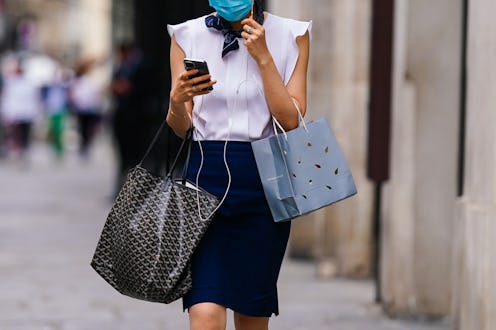
The coronavirus pandemic has claimed tens of thousands of American lives and upended the daily routines of countless others. Now, as states start to lift their stay-at-home orders, many people are wondering whether they can return to their pre-pandemic behaviors without putting their health at risk. One activity people want to resume right away is shopping.
Dr. Rodney Rohde, associate dean for research at the College of Health Professions at Texas State University, says shopping IRL can be safe once again. But it’s important to remember: The entire experience will be a lot different than it looked just a few months ago. “I do believe it can be safe to shop in person in stores if precautions are followed,” Rohde tells Bustle.
That’s a pretty big if. And those precautions can include a wide range of practices and procedures. If they aren’t strictly followed, shoppers could be at greater risk for contracting the virus.
Ahead, Rohde walks through some of the questions you may have about going shopping right now and in the weeks and months to come.
Is it safe to go shopping during COVID-19?
It’s all about taking the necessary steps and having strict guidelines in place that businesses will adhere to. According to Rohde, precautions include but are not limited to the following:
- physical/social distancing
- protective masks for both consumers and employees
- disinfection of high touch surfaces (including floors inside stores and entry ways of buildings, shopping carts or similar carrying equipment, handles, counters, etc.)
- barriers between employee and shoppers where physical distance is limited (payment kiosks, etc.)
- hand hygiene stations prior to entry in store and available in store in multiple locations
- employees available to conduct “surveillance” in store of any areas where shoppers may get congested to ask them to spread out
- signage about the rules and public health guidelines to respect everyone’s space
Do I need to wear a mask to shop?
“According to most research, wearing masks (cloth, surgical, etc.) will reduce the transmission of respiratory droplets from sneezing, talking, coughing, etc., which ultimately will reduce viral load in the air and on surfaces,” Rohde explains.
“They are not 100% protective, but they do show a reduction in the viral load in the environment. Of course, state and local guidelines may not allow for enforcement, but I would highly recommend them for shopping or any other thing people might do, where one is in an enclosed building or area.”
How will store layouts change?
Whenever possible, stores might want to spread out areas of high congregation. They can do so by placing markings on the floor to indicate how much physical distance is needed between people (you may have already seen this during your weekly grocery trips).
“If possible, they could rearrange high traffic areas where people may congregate,” he says. “They may also want one entry and one exit to keep an eye on the number of people in the store at any given time.”
What safety precautions will stores take?
In addition to the precautions listed above, this would include as much consumer and employee education as possible about how to wear a mask, hand hygiene, physical distance, etc. “Education with explanations in employee training — ongoing as conditions change — would be very useful,” Rohde says. “Likewise, businesses may want to implement a public health campaign centered around their store via signage, website info, and short, teachable videos.”
People also need to understand and value the importance of environmental services professionals like housekeepers and custodians. They’ll need to adapt to more cleaning and disinfection procedures taking place throughout the day, as well as deep cleanings of point-of-sale systems during slow times. “EVS professionals are a critical component for infection prevention and control in health care and in the community,” he says. “And yet they are not thought about in terms of better pay and respect.”
How will shopping be different after the pandemic?
“I believe it will be all about people — both consumers and employers — having a general public health safety ‘respect’ for each other,” Rohde shares. “We must emphasize these measures are for everyone, but especially those who are at high risk. Ultimately, it’s about being a good citizen to protect our fellow community members, even if one doesn’t think they need to protect themselves.”
Read more here:
Can Coronavirus Live On Clothes?
Is It Safe To Online Shop With Coronavirus? Your Questions, Answered
What Stores Are Closing Due To Coronavirus? The List Is Growing
If you think you’re showing symptoms of coronavirus, which include fever, shortness of breath, and cough, call your doctor before going to get tested. If you’re anxious about the virus’s spread in your community, visit the CDC or NHS 111 in the UK for up-to-date information and resources, or seek out mental health support. You can find all Bustle’s coverage of coronavirus here, and UK-specific updates on coronavirus here.